Story of a patriot
Ishtiaq
Aziz Ulfat
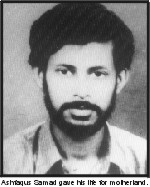 He
was the first born, the coveted one, he
was the sunshine of my parents, the special
one in the family. And special he was. He
was over six feet tall, lanky yet handsome.
He was naturally charming and full of life.
He always left behind a little of himself
in which ever path he walked, whomever he
came across. I guess, that is why even thirty
three years after his death his friends
and everyone who used to know him speak
of him so fondly, taking pride in their
acquaintance with him. It is as if they
still derive some nobleness, some modesty
by knowing, by being associated with this
gallant, noble yet gentle human being.
He
was the first born, the coveted one, he
was the sunshine of my parents, the special
one in the family. And special he was. He
was over six feet tall, lanky yet handsome.
He was naturally charming and full of life.
He always left behind a little of himself
in which ever path he walked, whomever he
came across. I guess, that is why even thirty
three years after his death his friends
and everyone who used to know him speak
of him so fondly, taking pride in their
acquaintance with him. It is as if they
still derive some nobleness, some modesty
by knowing, by being associated with this
gallant, noble yet gentle human being.
This
was Abu Moyeen Mohammad Ashfaqus Samad.
A long name indeed which is why his friends
had affectionately cut it down to Ashfi.
Though his nick name was Nishrat, my parents
had a special name for their special son;
they lovingly called him Tani. We younger
siblings according to custom called him
Bhaiya. But by whatever name he was called
it didn't matter. All loved him. It is indeed
very difficult to accept his death, especially
an untimely death. He was just 21, gone
from us forever.
Lt
Ashfaqus Samad has been laid to rest close
to where he had breathed his last, in Joymonirhat
in Rangpur district, having been killed
in a frontal battle against the occupation
Pakistani Army in the Liberation War of
'71. The only solace is that he laid down
his life to liberate his motherland, that
he died in free territory and that he breathed
free air before he died. He was brave and
he died young.
The
Pakistani Army's brutal assault on the unarmed
people of Bangladesh (the then East Pakistan)
coincided with the end of his honours final
of DU. His subject was statistics and he
was awaiting a reply from MIT in Chicago
where he was seeking admission. But who
knew then that he had been chosen for a
bigger and better task, to serve his nation,
to die for it and thus live forever. Who
could ask for more?
The
night of 25th March in 1971
On the fateful night of the 25th of March
we were standing around the traffic circle
in front of The Daily Ittefaq office. The
street was full of people, and everybody
in a state of tense apprehension, full of
energy, but did not know what to do. We
first saw two flares shooting up at the
sky around 10 pm. The first one going up
around the Gulistan area and the other one
above the Rajarbagh police line. Even after
all these years I can clearly picture the
"fireworks", as if some thing
that was happening just last night. The
light from the flares lighting up the dark
sky some how signaling the end of an era
and the beginning of another -- the end
of Pakistan (as it was) and the beginning
of Bangladesh. I say this today in retrospect
because at that moment we really could not
anticipate the magnitude of destruction
and horror that the Pakistan Army had let
loose on the innocent people of Bangladesh
on that fateful night.
We
heard the sounds of gunfire a few minutes
after seeing the flares, but the tanks actually
rolled in around midnight. They took their
position by the same traffic circle where
we were standing a little while ago and
fired the first shells targeting the Ittefaq
office. The shellings shook our house. Very
soon the newspaper office was ablaze and
the flame went sky high. Our house being
only a 100 yards away started getting the
heat. The iron bars on the windows started
to get hot and we kept pouring water on
them fearing that the wooden window shutters
might catch fire at any moment. Most of
the employees of the press had crossed over
to our house and went to safety through
the back, except the ill-fated ones who
took the direct hits. The fires and shootings
raged on for about two hours after which
things started quieting down, except occasional
gunshot sounds. Even then we were so scared
that we all huddled together all night long
on the ground floor in a narrow space under
the staircase. The next morning we crossed
over the wall to see the damage next door.
It was the first of the many horrendous
sights that I would witness over the next
few months till liberation. There were about
a dozen bodies, scattered all over the machine
room of the press, most of them burnt beyond
recognition.
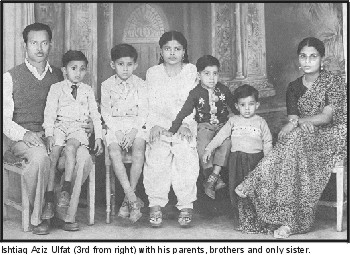 We
were all confined to our house, glued to
the radio till the next morning, when curfew
was lifted for a couple of hours. In spite
of my mother shouting at us not to leave
the house we strayed out. Having gone just
about 500 yards from our house I came across
a scene which really changed my whole attitude
towards life -- a small boy aged about ten
had tried to crawl under a gate, probably
when he had found the gate too high to cross
over. The marauding Pakistani army had shot
him dead as he had just put his head through
the gap under the gate and there he was
lying in a dried up pool of blood. This
was when I realised that it was all over,
that we were no longer Pakistan and that
we were a new nation and we must now fight
for our liberation and fight for a free
Bangladesh. My friends and I continued to
move about and went to Shakari Bazar into
old town, where we saw that most of the
houses were burnt, looted and marked with
bullets. In one of the houses we saw another
heart rendering scene; two bodies clinging
together burnt to the bone as if making
a statement saying, "together -- even
in death". From here we went on to
Jagannath Hall at Dhaka University where
a huge number of students had been killed
and the bodies were littered all over. On
the field next to it we saw the hastily
made mass graves of the ill-fated who were
lined up, shot and killed; their hair, clothes
and limbs still showing through the grass.
(This killing was later shown on TV after
liberation as it had been taped by some
amateur photographer)
We
were all confined to our house, glued to
the radio till the next morning, when curfew
was lifted for a couple of hours. In spite
of my mother shouting at us not to leave
the house we strayed out. Having gone just
about 500 yards from our house I came across
a scene which really changed my whole attitude
towards life -- a small boy aged about ten
had tried to crawl under a gate, probably
when he had found the gate too high to cross
over. The marauding Pakistani army had shot
him dead as he had just put his head through
the gap under the gate and there he was
lying in a dried up pool of blood. This
was when I realised that it was all over,
that we were no longer Pakistan and that
we were a new nation and we must now fight
for our liberation and fight for a free
Bangladesh. My friends and I continued to
move about and went to Shakari Bazar into
old town, where we saw that most of the
houses were burnt, looted and marked with
bullets. In one of the houses we saw another
heart rendering scene; two bodies clinging
together burnt to the bone as if making
a statement saying, "together -- even
in death". From here we went on to
Jagannath Hall at Dhaka University where
a huge number of students had been killed
and the bodies were littered all over. On
the field next to it we saw the hastily
made mass graves of the ill-fated who were
lined up, shot and killed; their hair, clothes
and limbs still showing through the grass.
(This killing was later shown on TV after
liberation as it had been taped by some
amateur photographer)
Bhaiya
left home for the first time on 27 March,
1971. At that moment it was only he who
knew that he was going to return shortly.
On April 4, Bhaiya and three of his close
friends made their way back into Dhaka.
They had brought back with them six 303
rifles, 25 grenades and several hundred
rounds of ammunition. They had done this
at a time when most others were either making
their way out of Dhaka to safety or were
thinking about it. He had done this act
when it was unthinkable. Yes, Bhaiya and
his friends were the first guerillas to
have taken up arms against the Pakistani
Army in Dhaka City. Bhaiya's other friends
were Shahidullah Khan Badal, Masud Omar
known more to his friends as Masud Pong,
and Badiul Alam Bodi who was later picked
up by the barbarian Pak army and was tortured
to death.
Bhaiya
and his friends had acquired these arms
from Kishoreganj where Major Shafiullah
had positioned himself with 2nd Bengal.
Badal Bhai had established contact with
Lt. Helal Murshed, and their trust further
cemented when Col Zaman (later on Commander
of Sector 6) had found his way there. Major
Khaled Musharraf with his 4th Bengal were
heading north towards Akhaura from B'baria,
and Lt Mahbub also arrived in Kishoreganj
to establish contact with the other fragmented
resistance forces. Later on Shafiullah,
Khaled and Zia and others were to congregate
at Teliapara is Sylhet at a tea estate where
the first training camp for the FFs was
to be established.
Bhaiya's
group of four having arrived in Dhaka around
dusk chose to halt for the night at our
house. We had no clue of what they were
up to, but they had to take my father into
confidence, and my father, a man born with
raw courage always stood by his children
and encouraged them in all their naughty
but bold and creative acts. They smuggled
the arms to our roof only to be shifted
to another friend's house in Dhanmondi the
next day, this friend being Tawhid Samad
and another recruit of that moment was their
friend Wasek. But it didn't take them very
long to realise that they could do little
with their new found arsenal. Bhaiya and
his friends decided to go up north and join
with the resistance forces there. Only Bodi
Bhai stayed back.
In
the meantime my second brother Tawfiq had
also left home to join the resistance struggle
at Roumari in Rangpur where he had some
friends. I also left home with a couple
of friends on the 18th of April, and after
about two weeks on the road we managed to
reach Agartala, from where we eventually
ended up at Matinagar, Sonamura, the first
training camp for Freedom Fighters at that
Sector, which was later on moved to Melaghar.
Here we took crash courses on small arms
and explosives from Capt Haider. We were
amongst the first batches of trained guerillas
who initiated sabotage operations in Comilla
and Dhaka. Later on in Dhaka we joined up
with the same group which Badal Bhai and
Bhaiya had organised before their departure
from here. We worked with this cell and
organised and recruited many more Freedom
Fighters who undertook many small and big
operations in the city.
Bhaiya
had come home to Dhaka for the last time
in early June and that was the last time
that his near and dear ones saw him. Soon
after his return to camp he was selected
for training as a commissioned officer where
he successfully completed his training and
was sent to liberate areas in the northern
part of Bangladesh. He was now Lt Asfaqus
Samad with his own company to lead. He and
his company liberated many areas of Bangladesh
till they reached a place called Raiganj,
forty kilometres north-west of Kurigram.
The Pakistan Army had set up a strategic
stronghold there. If they could be routed
from this bastion the occupation army's
next line of defence would recede to Kurigram.
Lt Samad and his fellow officers were planning
to launch an attack on this stronghold when
he received orders transferring him to Sector
Headquarters. His reaction was typical of
him. He sent a message through courier that
he would report to duty in a few days time.
He did not want to miss the big assault.
After all he and his colleague Lt Abdullah
had been planning it.
The
date of the assault was fixed for Nov 19,
1971. Ironical as it may seem, it was the
same day that his parents, being haunted
by Pakistan army due to their son's involvement
in the freedom struggle had left Dhaka for
sanctuary, either in a liberated area or
in India, where they had also hoped to meet
their beloved son. While Lt Samad's parents
embarked on this perilous trip towards the
west, Samad himself was sitting in a bunker
way up north preparing his line of attack
on the Pakistanis.
The
occupation Army's position was strong indeed.
Over the bridge on the river Dudhkumar they
had placed six medium machine guns. Across
the river they held fortified positions
in several buildings where there were at
least three more heavy machine guns with
them. The enemy had a good sight over the
plain area on the west of the river.
The
Mukti Bahini and the allied forces decided
to launch a five company strong attack --
two of the companies were of the Mukti Bahini
commanded by Lt Samad, one was a Rajput
company commanded by Major Opel of the allied
army and two companies were of the Border
Security Force. They would advance in the
dark of the night, dig in their positions
on the bank of the river and take on the
enemy.
The
advance was smooth. Digging in was about
to begin. Then there was an explosion. A
mine had exploded somewhere near the position
of the Rajput company. The occupation hordes
opened up with every thing they had.
Lt
Samad's reaction, who was in one flank,
was instantaneous. He ordered his troops
to retreat a few hundred yards and take
cover. He then ordered his faithful JCO
to leave his wireless set behind and go
back to join his troops. He himself would
call in artillery support. He would not
budge from his own position. Realising the
danger his JCO did not want to leave his
Commander.
Meanwhile
the situation had become precarious. The
Mukti Bahini companies as well as those
of the allied forces were finding it difficult
even to take cover. Firing from the enemy
was intense. Lt Samad took his second and
last decision. He shifted his position a
little and moved his own medium machine
gun with him. Then he opened up with his
weapon to give cover to his troops. The
enemy immediately concentrated all its fire
on the young soldier. The unequal fight
lasted for twenty minutes, but valuable
twenty minutes in which time the Mukti Bahini
troops had reached safety. Suddenly after
those breath taking twenty minutes the soldiers
on the liberation army could not see any
more spitting of fire from Lt Samad's machine
gun.
The
faithful JCO made a daring trip back to
his commander's position. There he found
the commander lying motionless. A bullet
had pierced through his forehead. But there
was no sign of agony on his face. He was
lying in peace. Only his fingers were clenched,
those long thin fingers which people say
is a mark of artistic inclination, those
fingers which Lt Samad's father and mother
so lovingly caressed and kissed even after
he had grown up. Gone was the darling of
Mr. Azizus Samad, a lion of a father, best
friend to his children, who had suffered
indescribable misery and torture in the
hands of the Pakistan army who had come
looking for his guerilla sons. Gone was
the darling of Mrs. Sadeqa Samad a prize-winning
teacher, a Fulbright Scholar, an Honorary
Judge whose mission in life was to love
other's children and educate them. Gone
was a valiant freedom fighter. And as long
as they lived never had a day gone by with
out his mother shedding tears for her son,
never had a moment gone by without his father
gazing out of the window, may be thinking
about his son, or may be wandering about
him and wishing for death to embrace him
at its earliest, so that he could join his
beloved son his beloved Tani.
 The
soldiers who fought under Lt Samad's command
loved him true and they fought a fierce
battle to recover his body, in the process
five of them laid down their lives. They
also held their mission dear. They and the
allied forces finally overran the occupation
army position. In the battle Major Opel
also laid down his life. The allies confirmed
their friendship in a stream of blood. After
the victory the soldiers performed the last
rites of their fallen commander and comrades.
Lt Samad and three of his comrades were
laid to eternal rest in a Joymonirhat mosque
compound with a 27 gun salute.
The
soldiers who fought under Lt Samad's command
loved him true and they fought a fierce
battle to recover his body, in the process
five of them laid down their lives. They
also held their mission dear. They and the
allied forces finally overran the occupation
army position. In the battle Major Opel
also laid down his life. The allies confirmed
their friendship in a stream of blood. After
the victory the soldiers performed the last
rites of their fallen commander and comrades.
Lt Samad and three of his comrades were
laid to eternal rest in a Joymonirhat mosque
compound with a 27 gun salute.
May
be Lt Samad had an ordinary death in an
ordinary Battle but ordinary he was not.
Uncanny as it may sound, two statements
on two different occasions still make me
wonder about something extra ordinary about
him. Once in a conversation with my mother
he had said in a matter of fact way, "Amma,
we are four brothers, can't you dedicate
just one for a greater cause, for the Liberation
of our Motherland?" Naturally he had
not expected an answer from her. But little
did we realize that he was speaking of himself
in a surrealistic way, or did he?
Another
time replying to a letter received from
his friend Ruma, he wrote on the 3rd of
Nov 1971, "It is nice to receive your
lovely letter here at the battle front.
Your letter reminds me in this bunker, amidst
all these explosions that there is another
world out there beyond this arena of death
& destruction." He did not forget
to make a point of the main purpose of his
being out there at the front, fighting a
war. And so without even realizing he patriotically
wrote, "You should be glad to know
that I am writing to you from a free territory
of Bangladesh and I have to tell you that
I never realized how sweet it is to smell
and breathe free air in free Bangladesh."
But at the end he did not forget the reality
around him, and that death might be just
round the corner which is so common fold
in war. In the last paragraph he writes,
"I liked your poem immensely. So, it
seems that there will be a poem or an epitaph
inscribed on our mass graves. I propose
that you write it. And of course do not
forget to leave a flower."
Souls
like Ashfaqus Samad and thousands like him
have sacrificed their lives so that we have
a free land of our own, a land to develop
or to destroy. Our land liberated by us,
to be ruled by us, our destiny in our own
hands.
Let
us believe this "worst of times"
we are in, shall pass too and a new generation
will be born. And they will see to it that
all crisis is over come, that all challenges
are met with bravery, just as our generation
did in 1971. Yes, patriots will again be
born -- if need be they will rise from the
Ashes.
.........................................................
The writer was a Freedom Fighter in Sector-2.
Date
-March 25, 1971
Target - Dhaka University
Fazlul
Haque, a guard at Iqbal Hall (now Jahurul
Haque Hall) describes the brutality of the
Pakistani Army on the night of March 25,
1971:
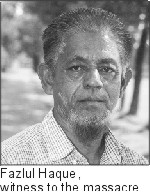 At
8:00 PM, Jatiya Samajtantrik Dal (JSD) leader
Sirajul Alam Khan came to the hall and requested
us to leave the hall quickly as the Pakistani
army might attack. He also directed us to
make barricades on the roads. The students
and staff began leaving the hall. At 10:00,
I left the hall and went home after completing
my duties. My home was just on the bank
of the western part of the hall's pond.
At
8:00 PM, Jatiya Samajtantrik Dal (JSD) leader
Sirajul Alam Khan came to the hall and requested
us to leave the hall quickly as the Pakistani
army might attack. He also directed us to
make barricades on the roads. The students
and staff began leaving the hall. At 10:00,
I left the hall and went home after completing
my duties. My home was just on the bank
of the western part of the hall's pond.
At midnight, the Pakistani
Army began their attack on the hall. Tanks
and jeeps entered the hall from the south-east
gate and later more army came through the
main gate. The hall came under a barrage
of heavy mortar and machine-gun attack from
near the pond in front and the police barracks
behind it. Immediately, students and bearers
from the hall and the Bengali policemen
from the Nilkhet barracks tried to escape
and seek refuge in the adjoining teachers
and staff quarters.
The army set the Nilkhet
slum on fire and in cold-blood machine-gunned
the fleeing slum dwellers. Many managed
to escape from the slum and also took shelter
in the staff quarters. The army also set
fire to the Palashi slum. The machine gun
attack on the hall set student rooms ablaze.
The hall, two slums, and a staff quarter
building were burning. The army shot a flare
lighting up the sky, and I saw about 1000
soldiers had taken position.
The sound of shells bursting
and guns firing, the smoke and fire, the
smell of gun-powder, and the stench of the
burning corpses, all transformed the area
into a fiery hell. The incessant firing
from mortars, tanks, and machine-guns continued
through the night. Huge gaping holes appeared
in the hall and the adjoining residences
of the bearers as a result of the shelling.
On the morning of the 26th, the Pakistani
killers began to go through the hall rooms
and began their orgy of murder and looting.
The army searched all through
the hall and killed at least seven students.
The unfortunate students were ATM Zafor
Alam, Jahangir Munir, Abul Kalam, Abu Taher
Pathan, Saleh Ahmed, and Mohammad Ashraf
Ali Khan. Shamshuddin, a night guard of
the hall who was locked at the hall provost
office, was burnt alive when the army threw
petrol bombs inside the office.
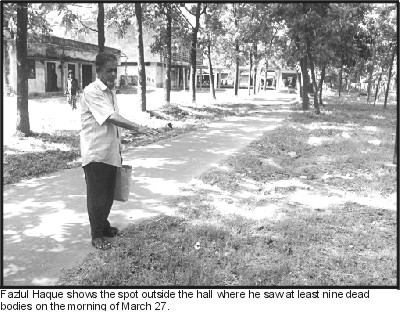 Chisty
Sah Helalur Rahman, the Dhaka University
correspondent for the Daily Azad was shot
in the early morning at the wall of the
house tutors quarter, near the water pump.
Abdul Jalil, food manager of the hall, was
killed beside my house at the western part
of the hall's pond. The water pump workers
of the hall were also killed.
Chisty
Sah Helalur Rahman, the Dhaka University
correspondent for the Daily Azad was shot
in the early morning at the wall of the
house tutors quarter, near the water pump.
Abdul Jalil, food manager of the hall, was
killed beside my house at the western part
of the hall's pond. The water pump workers
of the hall were also killed.
Having
finished their slaughter at Iqbal Hall,
the Pakistani army turned their attention
to the residential buildings. They murdered
DU teacher Professor Fazlur Rahman and two
of his relatives on March 26. We came to
the hall on March 27 after withdrawal of
curfew. I saw nine dead bodies beside the
road at the hall playground and seven bodies
on the ground near the quarter of the house
tutors. I have never seen brutality like
that of the Pakistani army on March 25,
1971.
Abdus
Sobhan, TV room caretaker of Iqbal Hall
(now Jahurul Haque Hall) describes the carnage:
We were informed at about
8:00 that the Pakistani army might storm
the hall. Hearing the news, almost all the
staff and students left the hall, though
many returned after a few hours. I could
not go because I was on duty in the TV room.
When my duty ended at 10:00,
I left the hall for safety with two colleges,
Shamsu and Sattar. In the middle of the
hall playground, we stopped and saw a number
of jeeps and tanks carrying the Pakistani
army were coming towards the hall through
the road behind the Muslim Hall (Salimullah
Hall) near the British Council.
Being
intrigued, I stopped for a few seconds in
the middle of the playground to observe.
I came to the south-west part of the playground
where there was a tamarind tree. Karim,
a Bihari used to sleep under the tree. I
took shelter in between two houses of hall
staffs and caught sight of the Pakistani
army coming towards the tree. The army roused
Karim and talked to him.
Taking Karim with them,
the army then moved to the south-eastern
part of the pond and took shelter there.
I heard a gunshot from the staff quarter.
At midnight the hall came under a barrage
of heavy mortar and machine-gun fire. The
Army set the Palashi slum on fire. The heaped
bodies of the dead from the slum were also
set on fire near the Nilkhet rail gate petrol
pump.
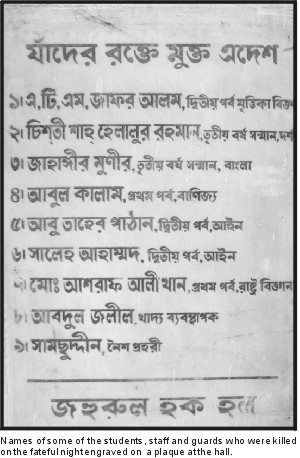 Some
surviving students were taken to the Iqbal
Hall kitchen where petrol was poured over
them and they were burnt alive. The university
correspondent of the Daily Azad was shot
near the water pump in the early morning.
So was bearer Shamshu. The water pump workers
of the hall as well as the bearers were
all brutally murdered by the Pakistanis.
Some
surviving students were taken to the Iqbal
Hall kitchen where petrol was poured over
them and they were burnt alive. The university
correspondent of the Daily Azad was shot
near the water pump in the early morning.
So was bearer Shamshu. The water pump workers
of the hall as well as the bearers were
all brutally murdered by the Pakistanis.
I
took shelter besides the houses of the staff.
The Pakistani army continued firing till
morning. They entered the hall at dawn.
We then moved to the Home Economics College
and took shelter on the second floor of
a decayed building. I could hear the cracking
sounds of bullets, the students and staffs'
pleas for mercy, and the sound of the soldiers
ransacking every room in the hall.
We could also hear the army
dragging two or three persons, perhaps students,
out from the hall. The army also dragged
out another two or three persons behind
the hall's canteen. After some time, we
observed the army was out of sight, and
began to return ,but approaching the hall
we saw the army still there. We ran back
to the Home Economics College. I was injured
seriously in my head. Some of the people
thought I had been shot. They took me away
and gave me primary medical treatment.
After few hours we returned
to the hall. Sattar, one of the hall staffs,
in an emotion-choked voice, requested me
to go with him to the provost office. He
said that his father might be there. I went
with Sattar and we found his father dead
inside the office. We also found several
dead bodies at the playground and two bodies
at the roof of the Mosque and one student's
body in his room.
...........................................................................................
As told to Hasan Jahid Tusher.

